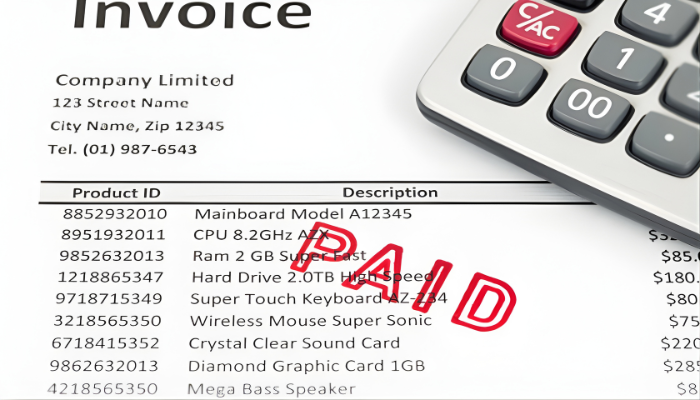
If you run a business, cash flow should be one of your top priorities. When revenue and spending are out of sync, you might find yourself facing a variety of business challenges.
If you invoice your customers for payment in 30, 60, or even 90 days, you might have a hard time planning out your cash flow. When your customers pay late or not at all, your finances take yet another hit. What solutions do you have? For short-term financing, invoice factoring might be your best bet.
Invoice factoring can smooth out the bumps without saddling you with more debt. Whether you are familiar with invoice factoring or not, this article will overview how the process works plus some advantages and disadvantages to help you decide whether this financing method is worth it for your business.
Invoice Factoring: An Overview
Invoice factoring is the practice of selling your invoices to a third party at a discount. This third party is a lender, usually called a factor or factoring company. After the sale, you receive a lump sum in cash, usually 70% to 90% of the face value of your invoices.
The lender takes over ownership and collection of the invoices you sell them. Once your customer or customers pay their invoice value to the lender, you receive the balance of the invoices minus factoring fees within a range of 1% to 5%, as decided in your agreement.
However, if your customers don’t pay, you must buy back the unpaid invoices and pursue collection yourself. An alternative to repurchasing the invoices is to sell other invoices of similar or equal value to those that were not paid often with zero advance.
Once the payment process is complete, you can then sell more invoices to the lender if you want, and the cycle begins again. The account set-up is very simple once you have an established relationship with a lender.
Invoice factoring is a relatively simple process, and it is a great option for a lot of businesses. Like any financing method, there are both advantages and disadvantages to consider before signing an agreement with a lender.
The Advantages of Invoice Factoring
Receiving fast cash is the most significant advantage of invoice factoring. You receive immediate working capital, sometimes the same day you sell the invoices to the factoring company.
Instead of waiting 30 to 90 days for your money, you experience an uninterrupted cash flow. The cash covers any funding gaps you might have and helps you offer longer payment terms to retain loyal customers. In the meantime, you have the money to grow your business and take advantage of new opportunities.
Factoring companies offer quick approval, unlike banks and other lending institutions. A factor bases approval on your customers' invoice values and their creditworthiness. Your business (or business owner) doesn't need a high credit score or spotless credit to use invoice factoring. This is a huge advantage for new companies with little credit history or businesses that have experienced credit issues.
When you factor invoices, you don’t need internal staff to help collect and process invoices, nor do you need equipment, software, or storage for the resulting paperwork. This allows you to free up internal resources and use that time and labor elsewhere.
To summarize, invoice factoring has a quick approval process, provides fast usable funds, helps stabilize cash flow, does not rely on business credit, and frees up internal resources.
Though this list of advantages are great, there are some disadvantages to consider.
There Are a Few Disadvantages
Invoice factoring isn't for every business. This financing method works best for business-to-business (B2B) companies that use invoices to obtain payment.
Most factoring companies require you to be in business for a minimum of one or two years and have a minimum annual revenue. Some companies may be willing to work with you anyway, but the agreement involves them taking on more risk.
Factoring can cost more than a traditional loan upfront. You must pay application fees, processing fees for each invoice, credit check fees for your customers, and late fees if the customer pays the invoice late. Late payments might trigger an increase in the annual percentage rate for factoring services.
When you factor your invoices, you lose direct control over the collection process. Though this is an advantage for some companies, it does mean that if the factoring company is unethical or unfair with your customers, it reflects poorly on you. That is why it is so important to work with a trustworthy and reputable factoring company.
Each company’s situation is different. If you are considering invoice factoring, don’t hesitate to reach out to a few companies to discuss whether factoring is right for you. A trustworthy factoring company will give you an honest answer and even suggest alternative funding options if needed.
What If Invoice Factoring Isn’t for You?
Maybe you deal directly with consumers, have a short customer list, or your customers have poor credit, so factoring may not work for you. The good news is that there are other business funding options available.
You can apply for a small business loan from a bank or the SBA (Small Business Association). Obtain a line of credit from your bank or apply for a business credit card. Check out all the financing options Factor Funding offers here.
Are You Considering Invoice Factoring?
A growing business needs a steady cash flow to meet emergency expenditures, take advantage of short-term discounts, and meet day-to-day operational costs. Some business opportunities may pass you by as you wait for traditional loan approval and cash disbursal. Factoring could be the answer.
Contact Factor Funding today to talk about whether invoice factoring is worth it for your business.



















